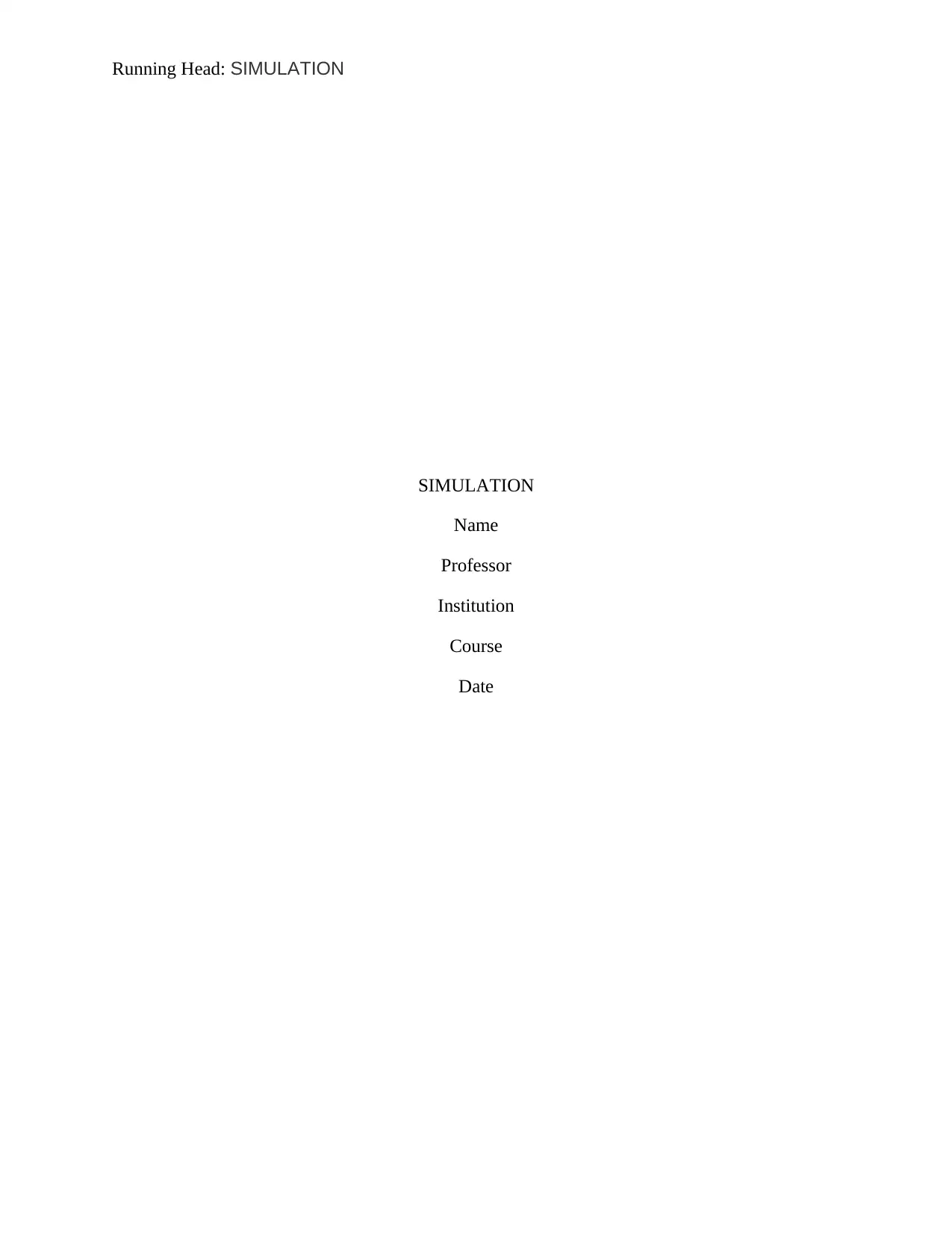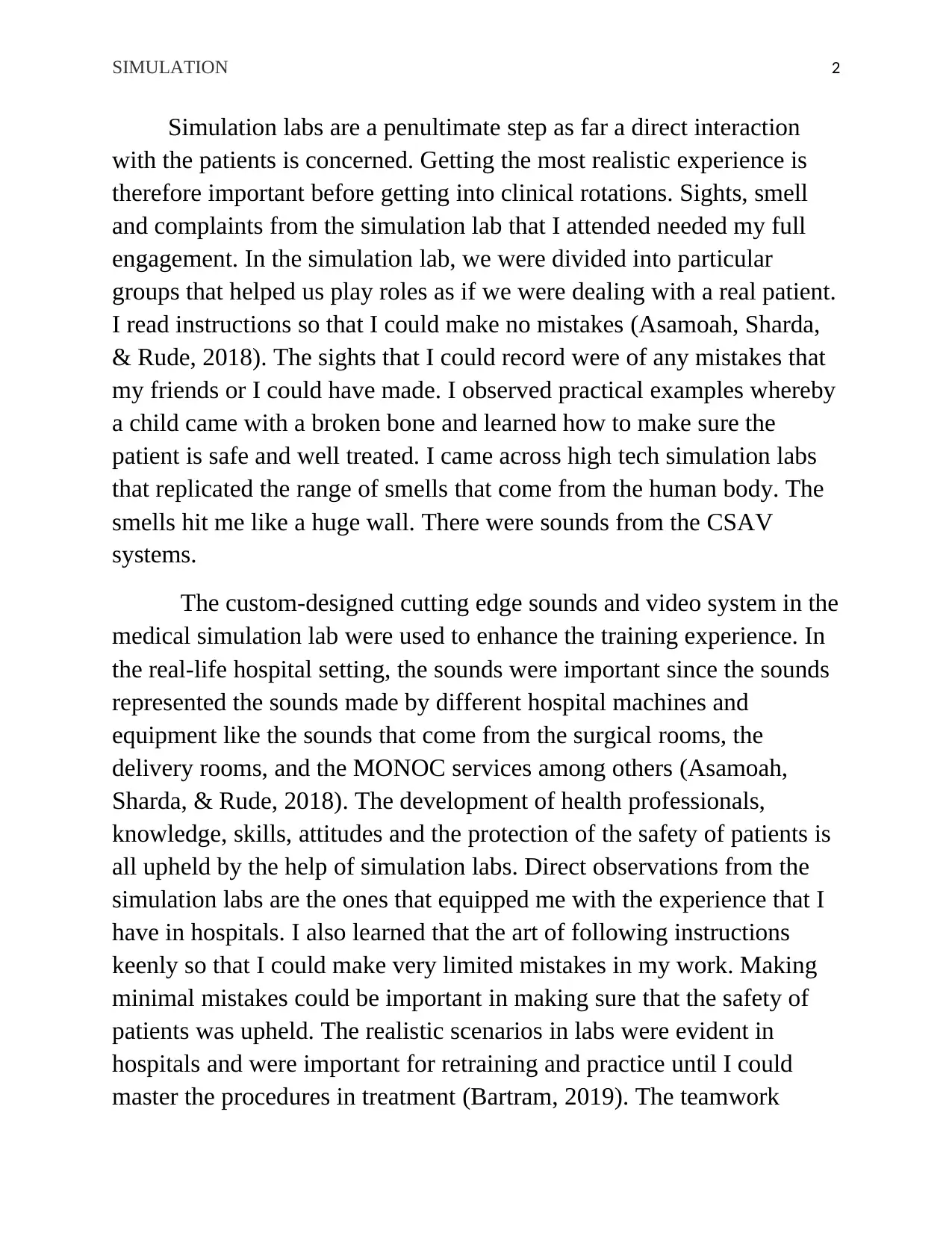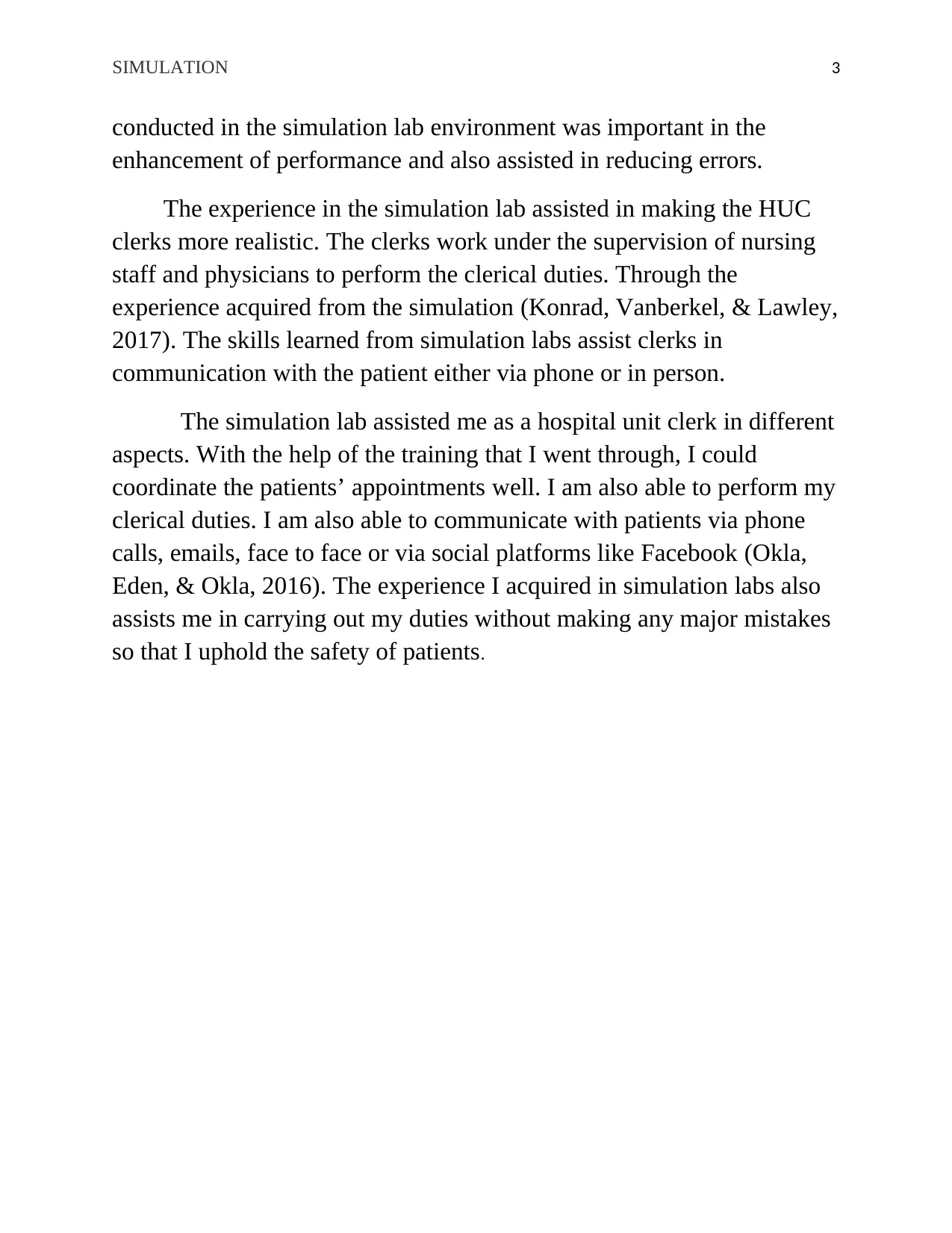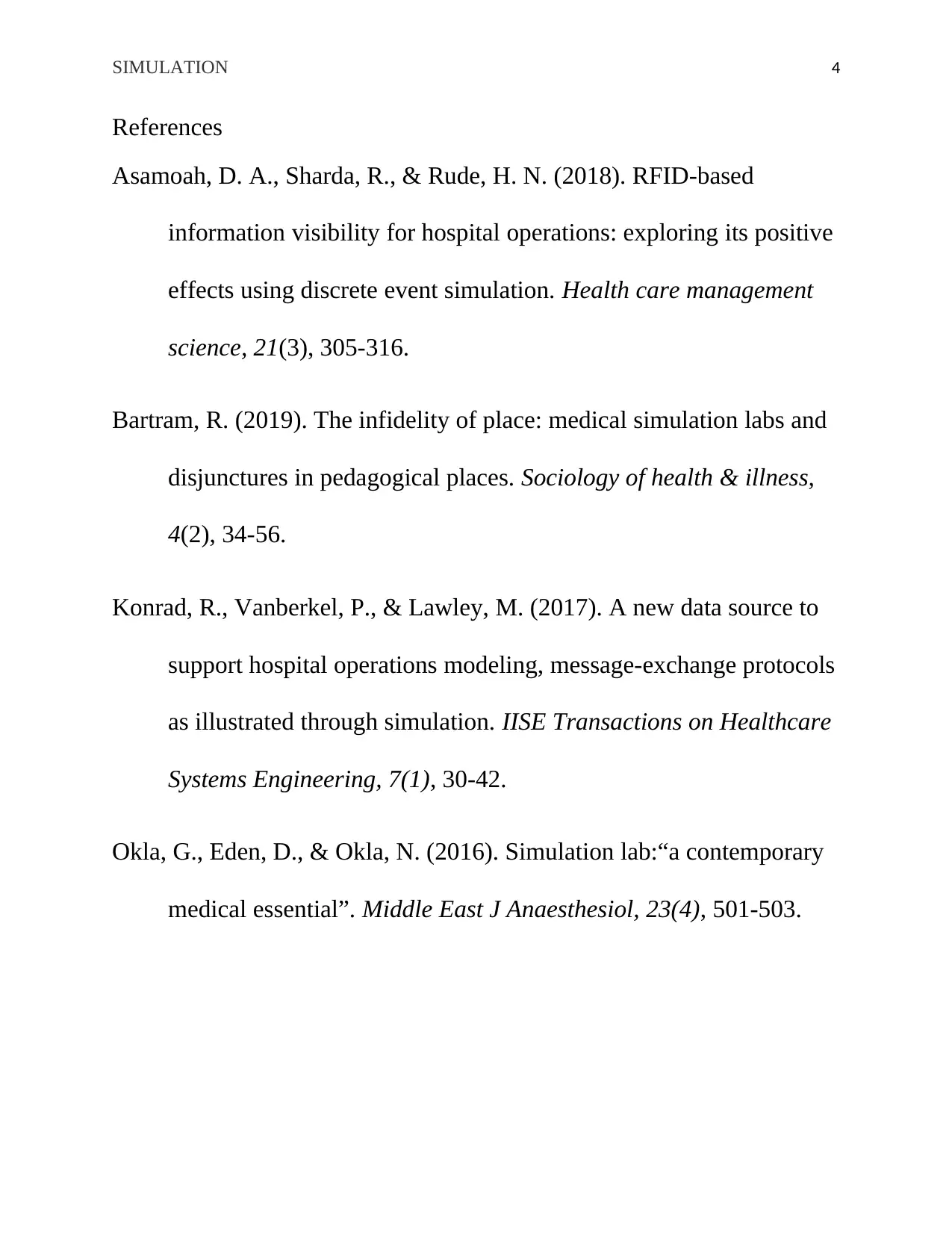Introduction to Simulation Labs | Report
VerifiedAdded on 2022/08/11
|4
|748
|17
AI Summary
Contribute Materials
Your contribution can guide someone’s learning journey. Share your
documents today.

Running Head: SIMULATION
SIMULATION
Name
Professor
Institution
Course
Date
SIMULATION
Name
Professor
Institution
Course
Date
Secure Best Marks with AI Grader
Need help grading? Try our AI Grader for instant feedback on your assignments.

SIMULATION 2
Simulation labs are a penultimate step as far a direct interaction
with the patients is concerned. Getting the most realistic experience is
therefore important before getting into clinical rotations. Sights, smell
and complaints from the simulation lab that I attended needed my full
engagement. In the simulation lab, we were divided into particular
groups that helped us play roles as if we were dealing with a real patient.
I read instructions so that I could make no mistakes (Asamoah, Sharda,
& Rude, 2018). The sights that I could record were of any mistakes that
my friends or I could have made. I observed practical examples whereby
a child came with a broken bone and learned how to make sure the
patient is safe and well treated. I came across high tech simulation labs
that replicated the range of smells that come from the human body. The
smells hit me like a huge wall. There were sounds from the CSAV
systems.
The custom-designed cutting edge sounds and video system in the
medical simulation lab were used to enhance the training experience. In
the real-life hospital setting, the sounds were important since the sounds
represented the sounds made by different hospital machines and
equipment like the sounds that come from the surgical rooms, the
delivery rooms, and the MONOC services among others (Asamoah,
Sharda, & Rude, 2018). The development of health professionals,
knowledge, skills, attitudes and the protection of the safety of patients is
all upheld by the help of simulation labs. Direct observations from the
simulation labs are the ones that equipped me with the experience that I
have in hospitals. I also learned that the art of following instructions
keenly so that I could make very limited mistakes in my work. Making
minimal mistakes could be important in making sure that the safety of
patients was upheld. The realistic scenarios in labs were evident in
hospitals and were important for retraining and practice until I could
master the procedures in treatment (Bartram, 2019). The teamwork
Simulation labs are a penultimate step as far a direct interaction
with the patients is concerned. Getting the most realistic experience is
therefore important before getting into clinical rotations. Sights, smell
and complaints from the simulation lab that I attended needed my full
engagement. In the simulation lab, we were divided into particular
groups that helped us play roles as if we were dealing with a real patient.
I read instructions so that I could make no mistakes (Asamoah, Sharda,
& Rude, 2018). The sights that I could record were of any mistakes that
my friends or I could have made. I observed practical examples whereby
a child came with a broken bone and learned how to make sure the
patient is safe and well treated. I came across high tech simulation labs
that replicated the range of smells that come from the human body. The
smells hit me like a huge wall. There were sounds from the CSAV
systems.
The custom-designed cutting edge sounds and video system in the
medical simulation lab were used to enhance the training experience. In
the real-life hospital setting, the sounds were important since the sounds
represented the sounds made by different hospital machines and
equipment like the sounds that come from the surgical rooms, the
delivery rooms, and the MONOC services among others (Asamoah,
Sharda, & Rude, 2018). The development of health professionals,
knowledge, skills, attitudes and the protection of the safety of patients is
all upheld by the help of simulation labs. Direct observations from the
simulation labs are the ones that equipped me with the experience that I
have in hospitals. I also learned that the art of following instructions
keenly so that I could make very limited mistakes in my work. Making
minimal mistakes could be important in making sure that the safety of
patients was upheld. The realistic scenarios in labs were evident in
hospitals and were important for retraining and practice until I could
master the procedures in treatment (Bartram, 2019). The teamwork

SIMULATION 3
conducted in the simulation lab environment was important in the
enhancement of performance and also assisted in reducing errors.
The experience in the simulation lab assisted in making the HUC
clerks more realistic. The clerks work under the supervision of nursing
staff and physicians to perform the clerical duties. Through the
experience acquired from the simulation (Konrad, Vanberkel, & Lawley,
2017). The skills learned from simulation labs assist clerks in
communication with the patient either via phone or in person.
The simulation lab assisted me as a hospital unit clerk in different
aspects. With the help of the training that I went through, I could
coordinate the patients’ appointments well. I am also able to perform my
clerical duties. I am also able to communicate with patients via phone
calls, emails, face to face or via social platforms like Facebook (Okla,
Eden, & Okla, 2016). The experience I acquired in simulation labs also
assists me in carrying out my duties without making any major mistakes
so that I uphold the safety of patients.
conducted in the simulation lab environment was important in the
enhancement of performance and also assisted in reducing errors.
The experience in the simulation lab assisted in making the HUC
clerks more realistic. The clerks work under the supervision of nursing
staff and physicians to perform the clerical duties. Through the
experience acquired from the simulation (Konrad, Vanberkel, & Lawley,
2017). The skills learned from simulation labs assist clerks in
communication with the patient either via phone or in person.
The simulation lab assisted me as a hospital unit clerk in different
aspects. With the help of the training that I went through, I could
coordinate the patients’ appointments well. I am also able to perform my
clerical duties. I am also able to communicate with patients via phone
calls, emails, face to face or via social platforms like Facebook (Okla,
Eden, & Okla, 2016). The experience I acquired in simulation labs also
assists me in carrying out my duties without making any major mistakes
so that I uphold the safety of patients.

SIMULATION 4
References
Asamoah, D. A., Sharda, R., & Rude, H. N. (2018). RFID-based
information visibility for hospital operations: exploring its positive
effects using discrete event simulation. Health care management
science, 21(3), 305-316.
Bartram, R. (2019). The infidelity of place: medical simulation labs and
disjunctures in pedagogical places. Sociology of health & illness,
4(2), 34-56.
Konrad, R., Vanberkel, P., & Lawley, M. (2017). A new data source to
support hospital operations modeling, message-exchange protocols
as illustrated through simulation. IISE Transactions on Healthcare
Systems Engineering, 7(1), 30-42.
Okla, G., Eden, D., & Okla, N. (2016). Simulation lab:“a contemporary
medical essential”. Middle East J Anaesthesiol, 23(4), 501-503.
References
Asamoah, D. A., Sharda, R., & Rude, H. N. (2018). RFID-based
information visibility for hospital operations: exploring its positive
effects using discrete event simulation. Health care management
science, 21(3), 305-316.
Bartram, R. (2019). The infidelity of place: medical simulation labs and
disjunctures in pedagogical places. Sociology of health & illness,
4(2), 34-56.
Konrad, R., Vanberkel, P., & Lawley, M. (2017). A new data source to
support hospital operations modeling, message-exchange protocols
as illustrated through simulation. IISE Transactions on Healthcare
Systems Engineering, 7(1), 30-42.
Okla, G., Eden, D., & Okla, N. (2016). Simulation lab:“a contemporary
medical essential”. Middle East J Anaesthesiol, 23(4), 501-503.
1 out of 4
Your All-in-One AI-Powered Toolkit for Academic Success.
+13062052269
info@desklib.com
Available 24*7 on WhatsApp / Email
![[object Object]](/_next/static/media/star-bottom.7253800d.svg)
Unlock your academic potential
© 2024 | Zucol Services PVT LTD | All rights reserved.

